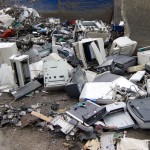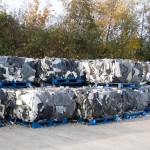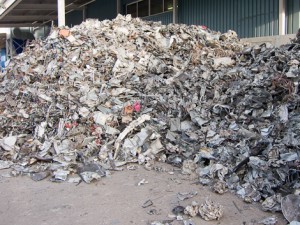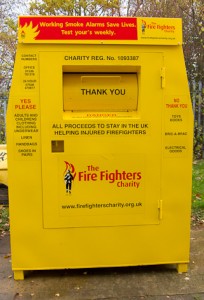One of the things that I think that we have in common with many companies is that we had a big cupboard (or in our case an area on top of the locker room) which we used to store our waste electrical items. The WEEE (Waste Electrical and Electronic Equipment) directive states that all waste electrical product made after a certain time should be taken back by the manufacturer – I think that most of our stuff was too old for that and as most of it is bought through our IT department it is probably difficult to find the original producer, much less make them take it back – it would just end up in a cupboard at a different site!
 A recent visit to a centre that takes in WEEE waste provided sufficient momentum to get the process started – at least for our site although heaven only knows how much there is to sort out at the rest of the other sites. All in all the process is quite simple. They sent us a list of hazardous waste which we would have to pay an additional charge for as well as a charge for a consignment note. Once the order was raised we had a pallet box on site for a week and then it was collected – as it was not far away we went to watch it being disposed of and had a great tour round the site. I even took some pictures to prove to our IT department that they would not be usable afterwards.
A recent visit to a centre that takes in WEEE waste provided sufficient momentum to get the process started – at least for our site although heaven only knows how much there is to sort out at the rest of the other sites. All in all the process is quite simple. They sent us a list of hazardous waste which we would have to pay an additional charge for as well as a charge for a consignment note. Once the order was raised we had a pallet box on site for a week and then it was collected – as it was not far away we went to watch it being disposed of and had a great tour round the site. I even took some pictures to prove to our IT department that they would not be usable afterwards.
 The bits of equipment are bashed to smaller bits by huge whirling chains, then the ferrous metals are pulled out by magnets and other metals separated from the plastics. The separate components are then bagged up and sold. In addition the company operates in conjunction with some retailers to operate a scheme whereby products that are rejected (if, for example they have a scratch) are tested and sold at a cheaper price. Certain products sent from the council recycling centre are also sold on to vetted buyers.
The bits of equipment are bashed to smaller bits by huge whirling chains, then the ferrous metals are pulled out by magnets and other metals separated from the plastics. The separate components are then bagged up and sold. In addition the company operates in conjunction with some retailers to operate a scheme whereby products that are rejected (if, for example they have a scratch) are tested and sold at a cheaper price. Certain products sent from the council recycling centre are also sold on to vetted buyers.
My colleague was a little concerned about the huge amount of stuff that is unthinkingly thrown away, something that worries me constantly. However, in this case, the alternative is that they continue to sit up on top of lockers and under shelves etc (although I believe the WEEE directive states that they should be disposed of within 12 months). At least now the plastic has been separated and will be recycled, as will the metals and the bits that make up the circuit boards. However, it does raise the question as to how do we make more use of our electrical products and stop just throwing them away because a newer, faster model has just been released on the market.

